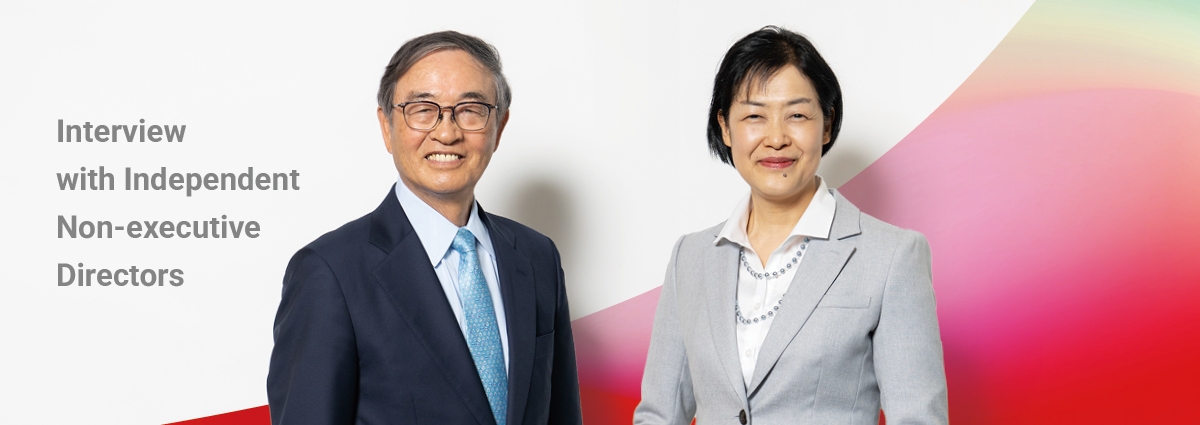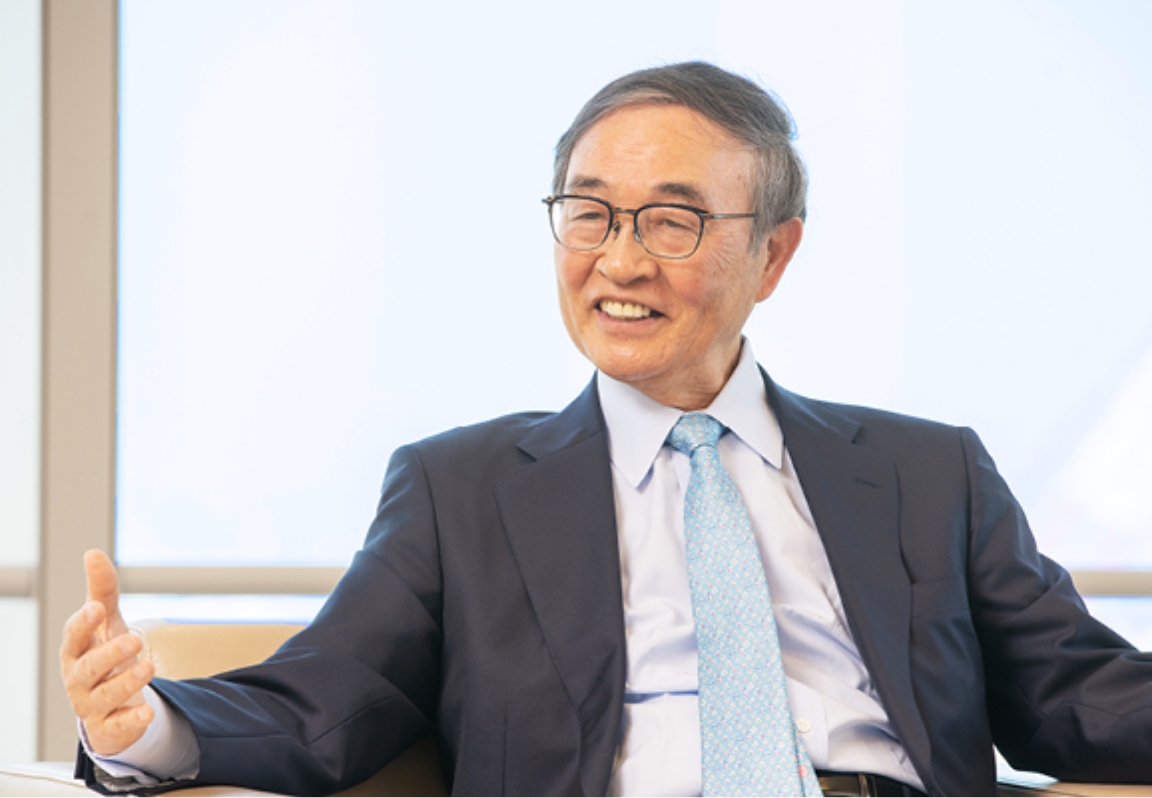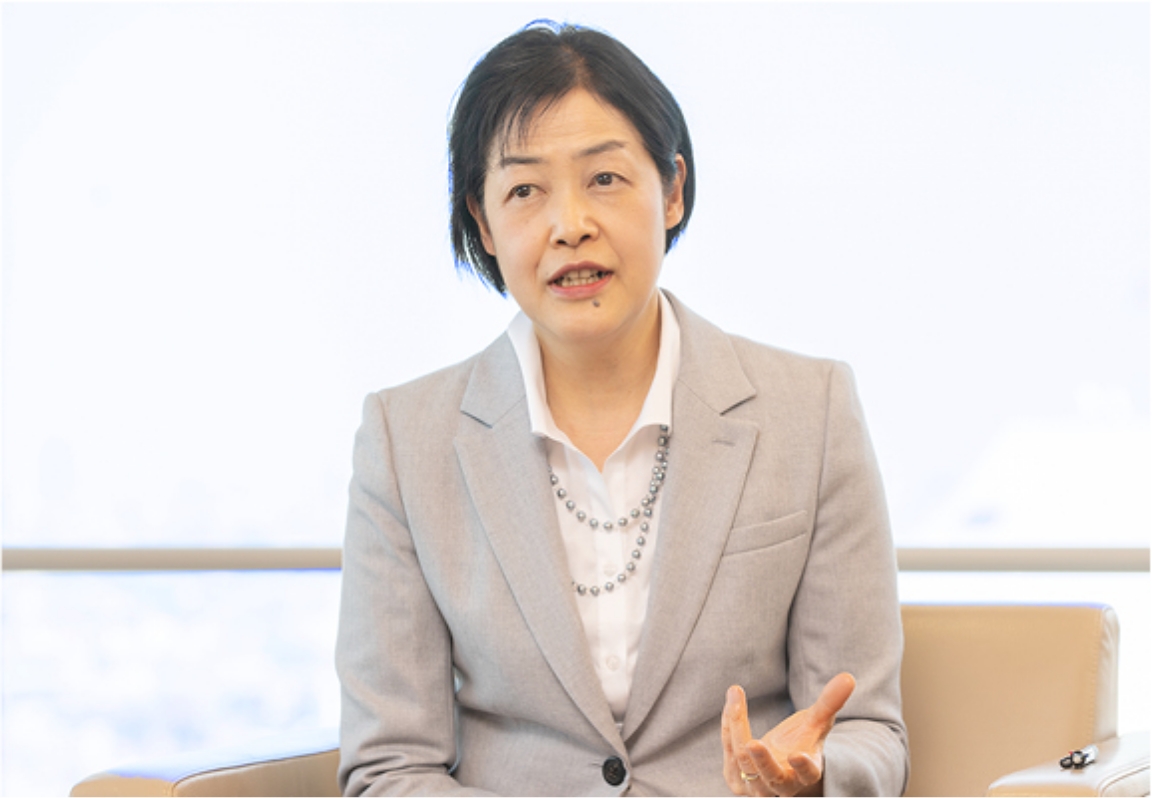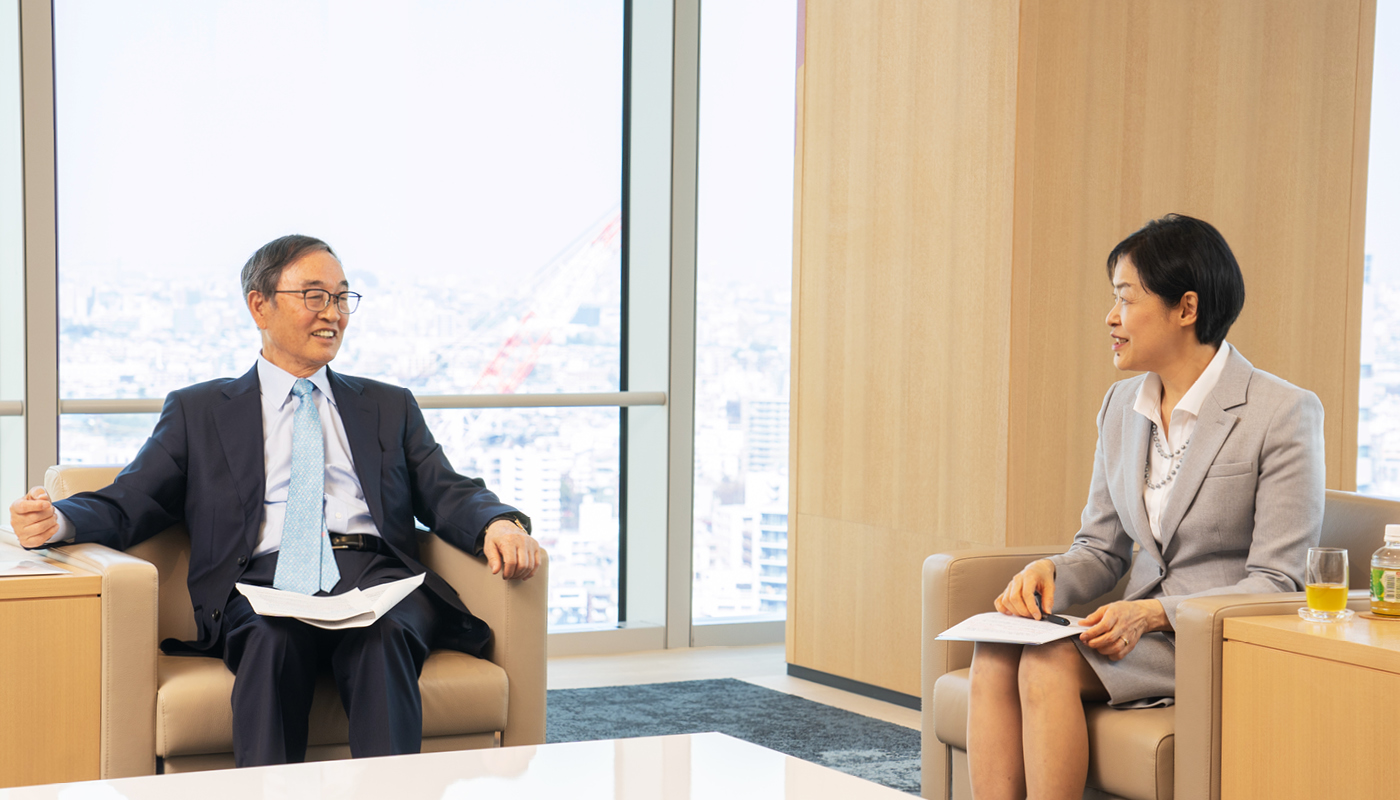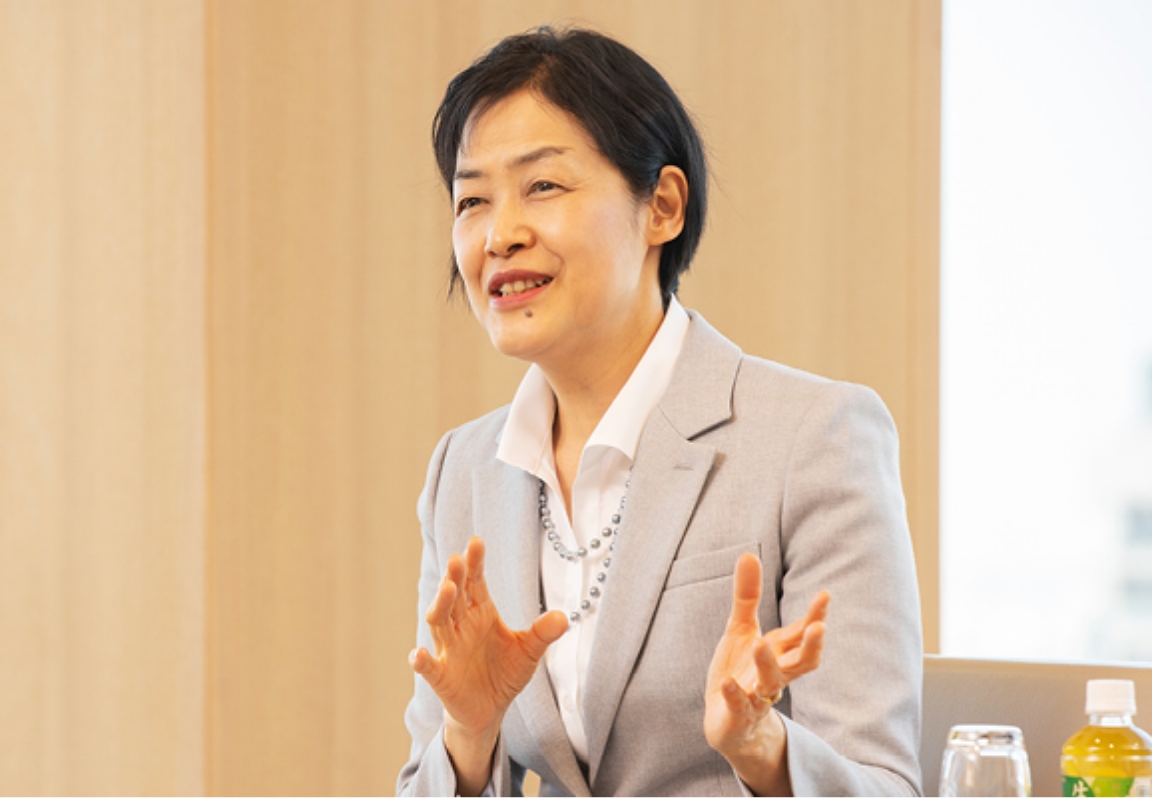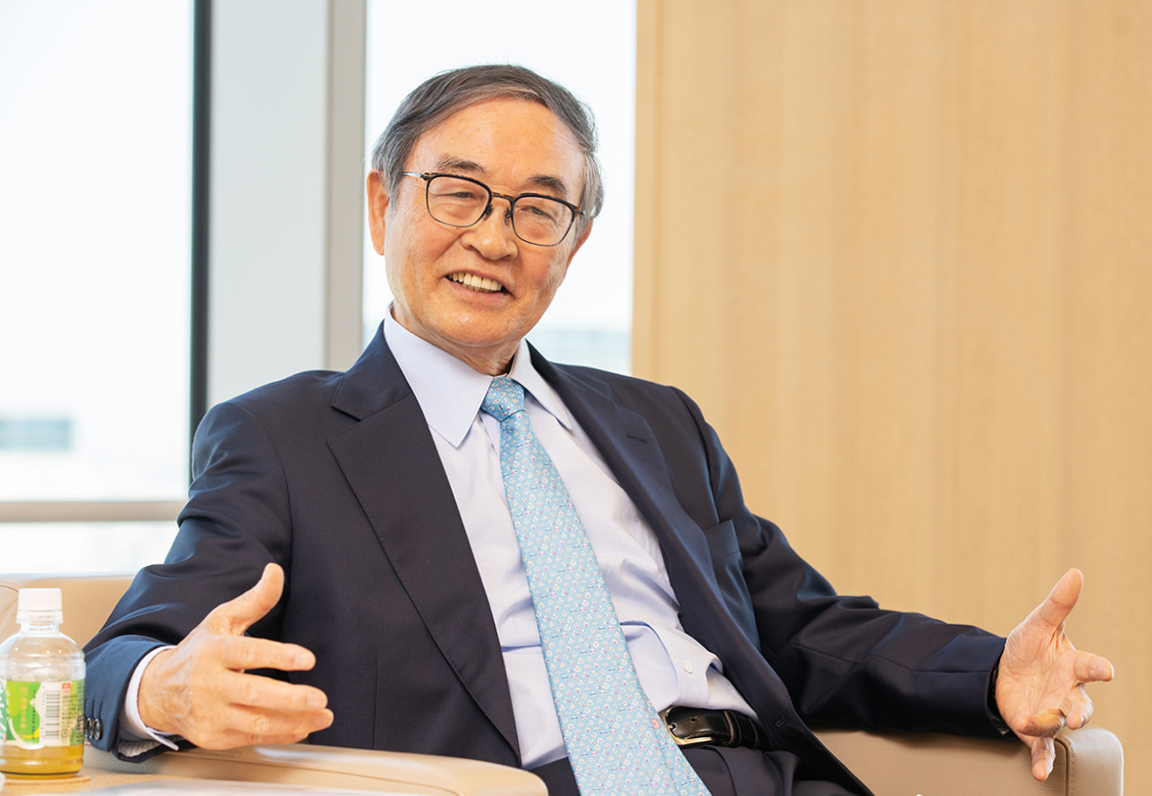Interview with Independent Non-executive Directors
June 5, 2023
A conversation between external directors of the board
Expanding the Scale of the Health Science Business Through Combined Internal and External Strengths
Masakatsu Mori
Independent Non-executive Director of the Board(Chairperson of the Board)
Joined Arthur Andersen & Co. in 1969. Assumed the position of Japan president of Andersen Consulting (now Accenture Japan Ltd.) in 1989 and went on to be Chairman and then Chief Corporate Advisor. He also served as a member of the International Board at the company for 13 years. He then started working as President of the International University of Japan in 2009 and went on to become Vice Chairman before assuming his current position as Senior Advisor. He became an Audit & Supervisory Board member for our company in 2015 and Non-executive Director of the Board in 2019. He currently acts as Non-executive Director for STANLEY ELECTRIC Co., Ltd. and Audit & Supervisory Board member for FAST RETAILING Co., Ltd.
Noriko Shiono
Independent Non-executive Director of the Board(Member of the Nomination and Remuneration Advisory Committee)
Joined Japan New Media Co., Ltd. in 1983. She then went on to work as Representative Director & President of SSP Co., Ltd. and President & Corporate Officer and Chairman& Director of Konami Sports & Life Co., Ltd. (Now Konami Sports Co., Ltd) before taking on her current role as president of Widex Japan. She assumed the position of Non-executive Director at Kirin Co., Ltd. in 2018. She became our Strategic Advisor in 2019 before taking her role as Non-executive Director in 2020.
Strengthen the Group’s Coordination to Accelerate Development of the Health Science Business
──What topics were discussed by the Kirin Holdings Board of Directors in 2022 and what did you deal with as a non-executive director?
Mori: The most important topic was that of the optimization of our business portfolio. We continuously discussed how we could create and improve value throughout the range of our group’s business, from Food & Beverages to Pharmaceuticals.
Two topics brought up in the many discussions were the withdrawal from business in Myanmar and the structural reform of Kyowa Hakko Bio Co., Ltd. We have organized the handling and risk management of these for the current term.
Shiono: On top of that, in 2022 we also started discussing strategies based on function, such as R&D and marketing that would improve the execution of management strategies. At the board meetings, I feel we were able to hold fruitful discussions to effectively move the entire group toward accelerating CSV management.
──The Kirin Group is expanding business into the Health Science domain based on the knowledge of fermentation technology and biotechnology, a core competence, that it has accumulated since the foundation of its first company. What is your opinion on this?
Shiono: It is believed a company is not guaranteed growth through only the continuation of current businesses. Businesses must always be thinking about creating new value using their core competencies (assets). From the perspective of our group, it is of great significance that we are applying fermentation technology and biotechnology, our core technologies, to newly enter the Health Science business. This is because the health science business is also a business development directly related to CSV in the sense that it solves health issues.
Mori: It’s just as Ms. Shiono said: a business is like a plant. If it stops growing, it dies. Our group could perish if we only rely on existing business. For this reason, we as non-executive directors believe taking on the Health Science business as a growth area is the correct strategy.
The global health science market is expanding, and there are many companies aiming to join. The Kirin Group, however, is not engaged in just any ordinary health science, but we are developing an integrated business from ingredient development to product manufacturing and sales with fermentation technology and biotechnology, one of our core competencies, as the foundation. Additionally, for example, if we were to incorporate ingredients from the Health Science domain into products in our Food business, the entire group would align, and we would see our entire business’ position changing.
Build an Integrated System Ranging from Ingredient Development to Product Manufacturing and Sales, and Exercise our Strengths in the Health Area
──What does the speed and progress of Kirin’s expansion in the Health Science domain look like?
Shiono: The business models and the process time in the Food, Pharmaceuticals, and Health Science businesses are different. In the Food business, lead time for the development of new products is comparably fast. On the other hand, the health science business can only be launched after various processes, including notification to and approval from the relevant ministries and agencies to demonstrate efficacy and effectiveness on the body. So, as you can see, the cycles of product development are different, and while analysts and investors in food-related industries may feel the process is slow, I think they will feel it is comparatively quicker compared to the development of pharmaceuticals in the same health industry.
That being said, we as the board are aware the market won’t wait for us, no matter the business. It is crucial that we have an accurate understanding of consumer needs and quickly provide materials and products, which is why the focus of the board in 2022 was the important topic of Health Science business. We are especially proud of being able to sort out the connection between the provision of specialty ingredients and other raw materials by Kyowa Hakko Bio on a B-to-B basis and the B-to-C business model of the Food business the Kirin Group is familiar with. As a result, we were able to finalize the entire business strategy, and I think we will be able to expand faster.
Mori: It is taking us a bit of time to get moving, but I don’t feel we are running behind. Furthermore, I think many of the world’s businesses use a business model for mass consumption and mass production, not just ours. When thinking about the health area, it is necessary to split the market into multiple segments. We are connecting our ingredients and the markets with our different approach as an existing Food business and creating new business focused on each segment from scratch, so it can’t be helped it is taking some time.
Shiono: While we are aware of the various opinions of investors, from the perspective of group synergy, I think having a fellow Group company like Kyowa Kirin Co., Ltd., which is involved in the Pharmaceuticals business, will help to push us. I believe it is because of the existence of a company that makes pharmaceuticals that contribute to healing that we can commit to health as a group.
Mori: That’s right. However, while Kyowa Kirin is a member of the Kirin Group, it is also an independent listed company. I think that we as non-executive directors of Kirin Holdings Company, Limited need to take note to keep the balance of independence and cooperation since each company has their own shareholders.
──We recently hear the word “BtoB/BtoC Linkage Model *1,” which has allowed us to see the possibilities of Kirin Group’s business development in the Health Science domain. What do you think about this model?
Shiono: We are moving forward towards establishing a model unique to the Kirin Group, the “B-to-B & B-to-C Link Model.” This model combines (1) the B-to-B model in which we provide Kyowa Hakko Bio’s ingredients to businesses for them to commercialize and (2) the B-to-C model in which we commercialize other products, such as Kirin Beverage Company, Limited’s beverages, and deliver them to consumers. In addition to Lactococcus lactis strain Plasma(LC-Plasma), which we have already begun working with, we intend to expand next with citicoline*2 and human milk oligosaccharides (HMOs)*3.
The important thing when it comes to business in the Health area is to broaden the scope of the business so the products can benefit a wide range of diverse people. Consumers choose health-related products based on whether they fit their lifestyle, so it is imperative we make our products accessible to a wide range of consumers. Our company creates good materials, and their effectiveness is proven, so if we also have partners who want to buy and commercialize them, we should broaden and grow the scope of the business by implementing the “BtoB/BtoC Linkage Model.”
Mori: FAST RETAILING, a company at which I am an Audit & Supervisory Board member, has transformed into an integrated system that does everything from material development, production and then sales. Through this, they have been able to understand their consumers’ needs and succeed in the development of products to meet those needs, resulting in a breakthrough in the apparel industry.
In the Health area, the Kirin Group won’t simply create an integrated system that does everything from material development to product production and sales, but we will look at each market’s segment separately, and our strength will be the ability to provide products developed from ingredients that optimize them for the target segments. There is significance in promoting the “ BtoB/BtoC Linkage Model,” which will not only provide materials within the group but will expand our provision of raw materials to other businesses.
- A business model in which businesses are linked, that utilizing the insights gained from selling the company’s own products in the BtoC business to create a new BtoB business that is not limited to ingredient sales.
- An ingredient found in the body that maintains the cell membranes of the brain and nerve cells, and has been used for many years around the world in medicines for brain diseases and health foods that support the improvement of cognitive functions. In Japan, it is currently classified as a pharmaceutical product.
- A generic term for oligosaccharides contained in breast milk. More than 200 kinds are contained in breast milk, and the results of research contributing to immunity and brain function, among others, have been reported.
──Where do you see certainty of growth in the Health Science business?
Mori: We have set a goal of 200 billion yen in net sales in our Long-Term Management Vision, “Kirin Group Vision 2027” (KV2027). It’s a bit of a lofty goal, but I believe we can reach it because we have Kirin Holdings’ Health Science Business Division leading the way and various companies handling health-related products, like Kyowa Hakko Bio, Kirin Beverage, and FANCL CORPORATION, have come together to work as one. The Health Science domain is a challenging area filled with competitors and new entrants, but I agree with the management’s decision to join the domain as part of our group’s growth strategy.
Shiono: I think there are a few benefits to the Kirin Group entering the Health area. First, if we have technical advantages, we will have a competitive advantage and entry into the area will be made difficult for others. For example, iMUSE (IMMUSE in some markets), which incorporates the use of LC-Plasma, was registered as a food with functional claims for immunity. Its safety and functionality have been proven with evidence, so it is difficult for other companies to join this domain, giving the Kirin Group a competitive advantage.
This year, this advantage has led us to providing LC-Plasma to Coca-Cola (Japan) Company, Limited. It is a competitive company in the Beverage business, so this is a groundbreaking initiative. If Kirin can exercise the trust and power its KIRIN brand has cultivated in the Food business, I think reaching a net sales goal of 200 billion yen is fully within our reach.
Incorporating Diversity to Develop Human Capital Capable of Overseas Business Management
──What should the Kirin Group do to strengthen their presence overseas?
Mori: Looking back on the Kirin Group’s overseas business, like the withdrawals from business in Brazil, the beverage businesses in Australia, and business in Myanmar, I see we have caused a lot of trouble for shareholders. Lion Pty Ltd in Australia is still facing many challenges. Based on these experiences, the current challenge of overseas business for the Kirin Group is to develop global human capital that can manage local subsidiaries and implement the global strategy.
When a company advances into new territory, global human capital are necessary; however, the reality is there is a shortage of global human capital, and we believe it is urgent to foster them. The Health Science business has a growing opportunity particularly in North America and the Asia-Pacific region, so the development of human capital that can open the path to overseas markets is becoming even more important.
Shiono: I agree. As is often the case with Japanese companies, the Kirin Group is a homogeneous organization that lacks women in management, foreign employees, and human assets with overseas experience. I feel it might be difficult to manage the diverse values of foreign countries in this non-diverse state we are in. In fact, this is a popular topic amongst non-executive directors.
In order to develop human assets that can manage the overseas business, it is necessary to bring in outside perspectives by appointing external human capital, including non-Japanese, and forming partnerships with other companies and incorporating values that differ from ours. We have been reforming the Kirin Group’s human resources strategy since 2022. We are also considering proactively hiring foreign workers, and the plan is progressing as intended.
Becoming a More Professional Group Through Change in Organizational Capabilities
──As non-executive directors, what are your opinions on the Kirin Group strengthening their “four organizational capabilities (drivers) for driving innovations”?
1) Diversity and inclusion, culture for innovation
Shiono: To be honest, I think it would be good to change the workforce in a more daring way. When developing human resources, the Kirin Group has mainly used the Japanese model of hiring fresh graduates in large numbers, giving them experiences in a wide range of areas, and then positioning them in a role they are likely to excel. If we are short on particular skills or experiences, we compensate by hiring experienced workers, but that alone isn’t enough.
The important thing is to combine these methods. In other words, we need to create a work environment for transferring the knowledge and skills of workers brought in from the outside to those who started with us. I believe this will also improve the entire team’s expertise through the creation of horizontal and vertical relations. I think the most effective method for realizing this is to bring mid-career hires and international workers into middle management. I expect this will change our organization into one with greater speed of innovation by bringing in outside perspectives.
Mori: With the strengthening of organizational capability, we are now looking for highly specialized professionals instead of traditional generalists who understand everything in a broad sense. We want to evolve into a strong organization full of professionals who have advanced knowledge and skills in specialized fields and who can compete with those in the same field at other companies. If we do this, I think we will be able to hire and retain external professional human resources more easily, just as Ms. Shiono mentioned.
2) Core technology that assures value creation
Shiono: The Kirin Group prides itself on its commitment to basic research as a company in the beer business. We especially see promise in the biotechnology area, a focus area of the Kirin Group. In recent years the world has been focused on veganism, and going forward we predict there will be a growing importance of medicine and health products that are vegan, uncontaminated, and non-chemical. We believe that the Kirin Group’s advanced research technologies in plants and microorganisms will support us in these conditions.
On the other hand, despite our strengths in basic research, and fermentation technology and biotechnology, I feel they are not fully recognized. Humility is important, but I think we should freely promote our technological skills and development capabilities in the Health Science business.
3) Consumer-centric marketing
Mori: In the Health Science business, knowing the consumers is crucial. Digital marketing technology that allows us to visualize consumer needs is essential, and we are rapidly developing it, but there is still a lot of room for the Kirin Group to enhance itself in this domain. We must enhance our ability to develop merchandise strategy based on data we gain from connecting with and learning about consumers. In the beer business, with craft beer and Home Tap at the forefront, connections with individual consumers have become vital. I want to keep an eye on the changes in the digital marketing space.
4) ICT accelerating value creation
Mori: I feel it’s necessary to enhance not only marketing but ICT (information and communication technology) as a whole. The Kirin Group has recently replaced our outdated accounting, production, and logistics system with SAP, but this is only a replacement of old technology. Going forward, we need to focus on the use of ICT in business. I believe it is necessary for us to look at ICT as a business reformation tool and to think of prioritizing the installment of ICT to areas where it can have significant benefits on business and where cost and risk can be minimized.
──In the Kirin Group 2022-2024 Medium-Term Business Plan (2022 MTBP), “focus on quality” and “building an SCM system that balances efficiency and sustainability” were added as two additional organizational capabilities. What are your thoughts on these new capabilities?
Mori: I think it was a good decision. Strengthening SCM (supply chain management) is especially important. Manufacturing and logistics capabilities to maximize brewery/factory utilization and minimize inventory level are the keys for Kirin’s business. How quickly can we produce top sellers and how quickly can we stop producing the worst sellers? These skills should be developed as the basic strengths of our group. We expect the SCM system to be even further enhanced by being prioritized it as an important organizational capability.
A Strong Governance System Built on the Trust of the Executives
──From the perspective of non-executive directors, does it look like the Kirin Group’s governance system is functioning?
Mori: I have been overseeing the Kirin Group since being appointed as an audit & supervisory board member in 2015, and I can confidently say that Kirin Holdings’ corporate governance is now first-class level. Over the past few years, many good changes were accelerated owing to a mutual trust between the non-executive directors and company executives.
CEO Isozaki and we have a deep mutual trust, and that allows us to have a CEO evaluation system led by non-executive directors. Non-executive directors can observe and evaluate the CEO and his team on how much value they are adding to the company in both the short- and long-term. For example, we make sure that the company holds a clear future vision and they are working toward realizing that vision by making future-oriented investments and developing human capital.
Many companies focus on short-term achievements when determining the president’s remuneration, but Kirin Holdings evaluates them based on medium- to long-term achievements. At the same time, non-executive directors are not automatically reappointed but are evaluated every year by the Nomination and Remuneration Advisory Committee. This evaluation is also reflected in the report of the Board of Directors’ effectiveness. Therefore, we can confidently state that our board members are all highly qualified and not being constrained by the term of service.
Shiono: At board meetings, the non-executive directors are forward with their opinions when talking to the executives, including the CEO. As a member of the board, I really feel the governance is functioning.
Mori: As chairperson, the thing I am most concerned about is whether management issues within the group are being raised on the agenda in a timely manner. This is because we from outside the company have limited information, for example, if something important is happening in the company and no one brings it up. In that regard, Kirin Holdings is giving us point-by-point reports on important management issues within the group, so we are able to discuss solutions with good timing. I believe this shows our relationship of trust.
When it comes to business strategies and operating plans, final decisions are only made after repeated discussions with the board. The executives listen to and reflect on the opinions of the non-executive directors and then brush up their proposal for the final board decision. It is through this cycle that we are able to make sound business decisions.
──What are the current governance-related issues?
Mori: One issue that comes to mind is the need to fortify a global governance system. This ties back to our discussion on human capital. We have to develop and appoint human capital capable of managing overseas businesses, we should enhance our system so that we can promptly understand the local conditions and quickly respond to any changes.
Shiono: If I was to bring something up, I would like to see the executives share more of their thoughts at board meetings. I understand the executives have discussed the issues at length within the company, but I would like to have more active discussions at board meetings.
I think we as non-executive directors need to be someone who can provide added value for executives. The non-executive directors bring a new perspective on results of discussions held within the company, offer respective opinions from their different fields, and help the board make better decisions. I hope to contribute to this process.
──Thank you for taking the time today to discuss your expectations and the issues within the Kirin Group. We hope to use today’s discussion to promote initiatives for further growth in the group.
Date of interview: March 2023
